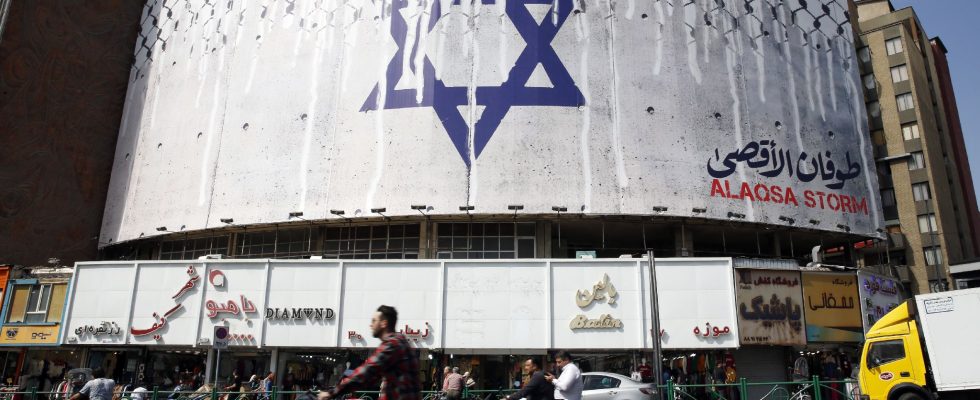Palestine Square, in Tehran, Saturday October 7: a few dozen demonstrators rejoice at the Hamas attack on Israel, displaying their joy while on a building, a huge banner proclaims in Arabic: “the great liberation has begun” . On another busy main street, Vali-Asr Square, a large screen sees the Israeli flag being replaced by a large black and white checkerboard, that of the Palestinian keffiyeh. The Islamic Republic of Iran has not failed in recent days to display its camaraderie with the Palestinian group, and to show its satisfaction at seeing its sworn enemy, the State of Israel – which Iranian officials never name – attacked in the heart.
Ismaïl Haniyeh, head of the Hamas political bureau, who visited Tehran last June, openly thanked the Iranians for their constant support. Iranian President Ebrahim Raïssi spoke of “the self-defense of the Palestinian nation”. Even if the authorities in Tehran have denied their direct involvement in this attack, for the ideologues of the Islamic regime in Iran, the destruction of Israel, as described in Hamas’ founding charter of 1988, constitutes an existential imperative. A propaganda narrative which opposes the “them” of the “Zionists” to “we the Muslims”, in a pan-Islamism which exploits the Palestinian cause.
A fundamental ideological alliance which translates very concretely into various forms of support. Since November 1988, when Yasser Arafat’s Palestine Liberation Organization implicitly recognized the existence, Iran has, in reaction, supported the terrorist group born in the wake of the first Intifada in 1987. This is notably through through the Lebanese Hezbollah, financed by Tehran, or by transporting money and weapons through smuggling networks, which the mullahs support the group. Dr. Ely Karmon, researcher at the International Counterterrorism Institute (ICT), recalls that Iran and Hezbollah have made technology transfers, allowing Hamas to manufacture its own missiles for several years. The scale of Hamas’s recent technological shift was certainly achieved through years of exchanges and training through infiltrated militants from Hezbollah and Iran, experts interviewed confirm.
If the long-term proximity between the group and the mullahs’ regime is not in doubt, it is the importance of logistical support for this specific operation which continues to be debated. For Emmanuel Navon, researcher at the Jerusalem Institute for Strategy and Security (JISS), “Hamas could not have carried out an operation of such magnitude without the technological, logistical and financial support of an external power , and that power can only be Iran. They would not have risked such an attack without having not only their green light, but also their explicit support.”
With Tehran, a complex relationship
“No one can deny that Tehran has the strategic desire to increase the military capacity of Hamas against the Israeli state, a policy decided at the highest level of the Islamic Republic – Supreme Leader Ali Khamenei and the Revolutionary Guards [la milice du régime]”, says Alex Vatanka, director of the Iran program at the Middle East Institute in Washington. The relationship between the Shiite Islamic Republic and the Sunni political-military organization was by no means obvious, and has had its ups and downs, notably during the war in Syria. At the time, Hamas supported the Syrian insurgents and even left Damascus, Tehran’s ally, to settle in Qatar. But relations quickly warmed up again, in the face of common interests. According to this researcher, “Israel has recently stepped up its operations against the Islamic Republic, and the best way for it to respond is to arm Hamas.”
For his part, American Secretary of State Antony Blinken preferred to remain cautious: “We have not seen proof that Iran sponsored or controlled this particular attack, but there is certainly a long relationship” between the Hamas and Tehran. A diplomatic language allowing responsibilities to be recognized, without committing the United States if the Israelis wanted to retaliate against the Islamic Republic. According to information from Wall Street Journal, the Islamic Revolutionary Guard Corps actively helped Hamas plan the operations. For Lieutenant Masha Michelson, spokesperson for the Israeli army, there is no doubt: “Traces of Iranian involvement are everywhere in this operation.”
Fear of Saudi Arabia’s nuclearization
“Iran sent Hamas on a suicide mission to prevent American-Israeli-Sunni rapprochement and peace in the Middle East,” insists Amir Avivi, former commander of the Israeli armed forces in Gaza. Ely Karmon explains Tehran’s fears: “Behind the coming rapprochement between Saudi Arabia and Israel, the Iranians fear seeing the Saudis obtain American support for a civil nuclear program, which Prince Mohammed Ben Salman has long desired.” But also, the assurance of a security guarantee from Washington. A scenario that was difficult to tolerate for Tehran, which feared a definitive challenge to the regional balance. Iran has been seeking Western approval for its civil nuclear program for twenty years, a subject which has caused multiple tensions with the West. A few days before the October 7 attack, and as the possibility of an Israeli-Saudi agreement grew closer, Ali Khamenei, Iran’s supreme leader, warned: “governments that pursue the ‘normalization bet’ with the regime Zionist will suffer a lot.”
While the Israeli authorities seem not to rule out the idea of a land and necessarily disastrous response against Gaza, Emmanuel Navon believes that the eradication of Hamas is the only scenario for ending the crisis: “If Hamas is dethroned and with the help of Egypt, the United Arab Emirates and other Arab countries, Saudi Arabia in particular, we manage – I speak in the conditional – to install another type of government, possibly in this case, it “There might be talks possible, but as long as Hamas is in power with the active support of Iran, that is impossible.”
